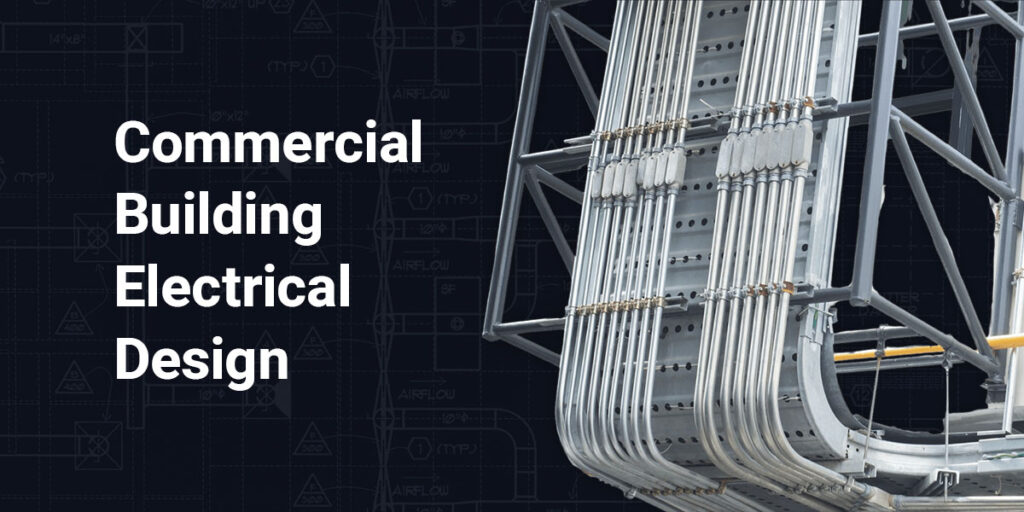


Electrical systems affect a building’s functionality, efficiency and safety. Their design is a complex and critical task that demands careful planning, meticulous attention to detail, adherence to strict safety standards and a thorough understanding of a structure’s unique needs.
A well-thought-out commercial electrical plan ensures safety and functionality, whether you’re constructing a new office building, renovating a retail space or designing a health care facility. Explore these and other crucial considerations in our electrical design guide for commercial buildings.
A comprehensive commercial electrical design incorporates four components that work together to ensure safe, efficient and reliable power distribution throughout the facility.
Electricians must consider several essential factors to ensure a successful and compliant installation.
The building’s intended use and square footage will dictate the electrical load requirements and distribution layout. For example, a large manufacturing facility will have significantly different electrical needs than a small retail store. Consider the specific activities that will take place within the building and how they will impact the electrical system design.
Incorporating energy-saving measures, such as LED lighting and smart controls, can significantly reduce operational costs and minimize the building’s environmental impact. Thoroughly analyze potential energy-saving strategies and consider integrating renewable energy sources, such as solar panels, to enhance the building’s sustainability.
The number of occupants and their specific electrical needs, such as lighting, outlets and specialized equipment, are additional variables. For instance, office building developers should account for computers, printers, servers and similar equipment. Meanwhile, a restaurant will need power for kitchen appliances, refrigeration and lighting in the dining area.
Ensuring your electrical design for building construction adheres to all applicable codes and standards, including the National Electrical Code and local amendments, is crucial for the project’s safety and legal compliance. Familiarize yourself with your jurisdiction’s specific requirements and consult with local authorities to ascertain that your design meets all necessary criteria.
Designing a flexible electrical system allows for easier accommodation of potential changes in occupancy, technology or building use over time. Consider incorporating additional capacity, modular components and easily accessible wiring to facilitate future upgrades and expansions.
Creating a commercial electrical design involves several vital steps to ensure a safe, efficient and code-compliant installation.
First, thoroughly assess the building’s electrical requirements based on its intended use, occupancy and equipment needs. This evaluation includes:

Engaging with stakeholders, such as architects, city electrical officials, the fire department and equipment suppliers, is vital for gathering accurate information and addressing all needs.
With the electrical needs assessment complete, it’s time to create a detailed power distribution plan that outlines the main service entrance, switchboards, panelboards and brand circuits. This plan should also factor in voltage drop calculations and load balancing for optimal performance and reliability. Consider wire sizing, conduit layout and equipment placement to minimize power losses and enable efficient distribution throughout the building.
Lighting is a critical component of any commercial electrical plan. Electrical designs feature an efficient and effective lighting system with appropriate fixtures, controls and daylighting strategies. Consider the following factors when selecting lighting products:
Electrical design plans can integrate smart control systems, such as occupancy sensors and dimming capabilities, to optimize energy usage and enhance occupant comfort.
Depending on the building’s purpose, electrical designs may need to feature specialty electrical systems such as fire alarms, security systems, data networks or audiovisual equipment. Coordinating with other disciplines, such as mechanical and plumbing, is vital to ensure proper integration and functionality of specialty systems. Include detailed specifications for each specialty system in the commercial electrical design, including equipment requirements, wiring diagrams and installation guidelines.
Electrical systems do not operate in isolation — they must seamlessly integrate with things like HVAC, plumbing and fire protection. Electrical designers usually collaborate with professionals from these disciplines to make all elements work harmoniously and efficiently. This collaborative effort allows time for experienced technicians to identify potential conflicts early and develop solutions that optimize overall building performance.
Designing electrical work in commercial buildings requires a thorough understanding of applicable codes and regulations. Code consulting ensures commercial electrical design meets all safety and performance standards. Failing to comply with codes can result in costly delays, rework and avoidable hazards.
Working with experienced design engineers specializing in commercial building electrical design is essential. These experts have the knowledge and skills to interpret and apply the relevant codes to create a safe, reliable and legally compliant electrical system.
Designing electrical systems for commercial buildings requires specialized expertise, so only knowledgeable, competent technicians should do it. At CSI Engineering, our team of highly talented and experienced professionals provides comprehensive commercial electrical design services that meet your project’s unique needs.
With over 25 years of experience and a team of LEED BD&C-accredited engineering design pros, we can tackle even the most challenging projects. Our principal engineers actively participate in every project and are available day or night to answer your questions, providing the responsive and personalized service you deserve. From new construction to historic building renovations, CSI Engineering has the specialized skills to deliver code-compliant, efficient and reliable commercial electrical plans.
Call us at 603-319-8244 or contact us online today to learn how we can help you design an electrical system that meets your needs and adheres to all codes.
